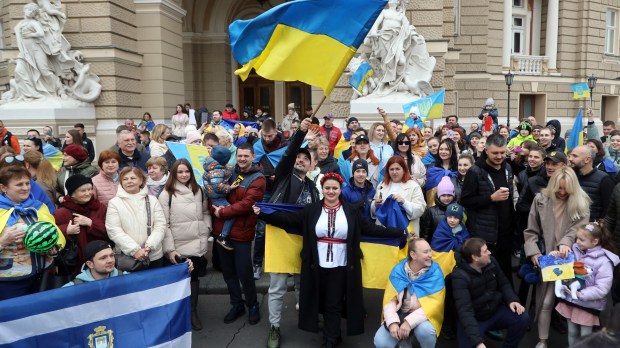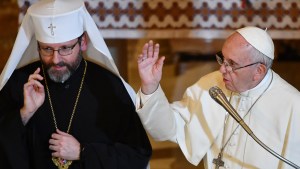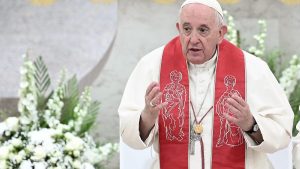Lenten Campaign 2025
This content is free of charge, as are all our articles.
Support us with a donation that is tax-deductible and enable us to continue to reach millions of readers.
Speaking during a special liturgy in St. Peter’s Basilica in Rome on Saturday, the head of the Ukrainian Catholic Church thanked the bishops, priests, and monks of Kherson, Ukraine, for imitating the Good Shepherd while their region was under Russian occupation.
Major Archbishop Sviatoslav Shevchuk of Kyiv-Halych of the Ukrainian Greek Catholic Church spoke as Ukrainians celebrated what appears to be a major victory in the defense of their nation against Russian aggression. Russia this week pulled its troops out of Kherson, a Black Sea port city and the only regional capital Russia has managed to capture since its February 24 invasion of Ukraine. Ukrainian forces began securing the city on Friday [photo above shows people from Kherson living temporarily in Odesa celebrating the liberation].
“All signs show that we have nothing to fear,” Major Archbishop Shevchuk said during his homily in St. Peter’s.
At the tomb of St. Josaphat
The major archbishop, who visited Pope Francis, Pope Emeritus Benedict XVI, and various Vatican departments this week, led a Divine Liturgy at the tomb of St. Josaphat Kuntsevich, an archbishop of the Ruthenian Catholic Church who was killed by an angry mob in Vitebsk, in the eastern peripheries of the Polish–Lithuanian Commonwealth (present-day Belarus). He is the best-known victim of anti-Catholic violence related to implementing the Union of Brest, which brought several Ukrainian Orthodox bishops into communion with Rome and is the beginning of the Ukrainian Greek Catholic Church.
The liturgy on November 12, St. Josaphat’s feast day, initiated a Jubilee Year leading up to the 400th anniversary of the martyrdom of St. Josaphat.
Saturday’s event, though, happened to take place as Ukrainian forces retook the city of Kherson, in the country’s south.
“Today we want to thank you for the liberated Kherson, for the fact that our fathers did not leave that city,” Shevchuk told a large gathering near the altar of the tomb of St. Josaphat in St. Peter’s. “We would like to thank the Basilian Fathers from the St. Volodymyr Monastery and all our other priests in Beryslav, Zmiivka and other parishes.”
St. Josaphat was a monk of the Order of St. Basil the Great — the Basilians.
“At a special moment in the history of our Church and Ukraine, full of pain, blood, torment and suffering, we are gathered here, in the heart of Christianity, at the tomb of the Apostle Peter,” the major archbishop continued. “And the holy hieromartyr Josaphat gathered us here.”
He reflected that “the main force of his figure, the force that, by the grace of the Holy Spirit, renewed Kyiv monasticism in his time, was a call to conversion, a call to everyone to come through the open gate, which is Christ himself, in His Sacrament of Repentance, mercy.”
“You will not lack anything”
The Gospel reading at the liturgy was that of the Good Shepherd. “And what is His goodness?” Shevchuk said in his homily. “He does not leave the sheep, He knows what they need. He heals their wounds, leads them to a safe place.”
“Those words about Christ the Lord Jesus as the Good Shepherd were reread again and again by each of our bishops, priests, abbots of one or another monastery, when they saw the approaching Russian army,” he said. “When he had to make a difficult choice – what to do: stay here, in place, or leave the occupied territory, that community, those people? And today I want us all together to be grateful that our Church has good shepherds like our Savior Christ Jesus.”
“Let’s remember those words, ‘Even when I pass through the shadow of death, I will not be afraid. Because He is with me, He is the rod of my salvation, He is the staff of my fortress,” Shevchuk said. Referring to the bones of St. Josaphat, buried beneath the altar, he continued, “Today, we feel here at those holy relics some indescribable power that comes to us. We will all go to our homes, we will return again to Ukraine, which is suffering and bleeding, and we will come full of God’s word about the Good Shepherd who is with us and says: ‘You will not lack anything.’”
The truth about Ukraine
Commenting on his week in Rome, which was only the second time he has left Ukraine since the February invasion, Shevchuk said he came to “present the truth about Ukraine to the Holy Father and the whole world, to be the voice of this long-suffering people.”
On Monday, November 7, he met with Pope Francis, telling him that Ukraine cannot negotiate with Russia as long as Moscow treats its neighbor as a colony to be subjugated.
“The war in Ukraine is a colonial war, and the peace proposals coming from Russia are colonial appeasement proposals,” he told the Pope. “These proposals involve the denial of the existence of the Ukrainian people, their history, culture and even the Church. It is the denial of the very right to the existence of the Ukrainian state, recognized by the international community with its sovereignty and territorial integrity.”
On Wednesday, November 9, Shevchuk visited Pope Emeritus Benedict XVI in his residence at the Mater Ecclesiae monastery in the Vatican. He told Benedict about the consequences of the war in Ukraine and asked him to “continue to pray for peace in our country.” The Pope Emeritus asked Shevchuk to convey words of support and his blessing to the entire Ukrainian people.



